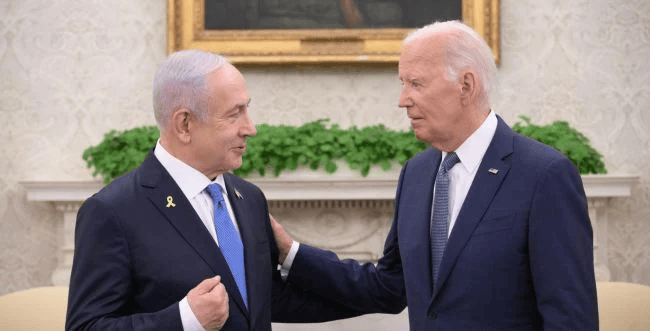Inside Biden's Crucial Call: The Last Push to Free Israeli Hostages
Urgent: Joe Biden pressures Benjamin Netanyahu for "immediate Hostage-Ceasefire Deal" as deadline looms
In a significant phone conversation on Sunday, Prime Minister Benjamin Netanyahu and US President Joe Biden discussed the ongoing negotiations for a ceasefire and hostage release deal, as efforts to finalize an agreement with Hamas continue in Qatar. While the deal is not yet finalized, both leaders expressed cautious optimism about the progress being made.

Biden Urges Urgent Hostage-Ceasefire Deal in Call with Netanyahu, as Negotiations Reach Critical Stage
The call followed Netanyahu’s deployment of a senior team of negotiators to Doha, including Mossad chief David Barnea, Shin Bet director Ronen Bar, IDF hostage coordinator Maj. Gen. (res.) Nitzan Alon, and political adviser Ophir Falk. This move signals that the talks are nearing their final stages.
At the same time, Netanyahu is reportedly engaging with members of his far-right coalition to assess their stance on a potential deal, given their previous threats to leave the government over such an agreement. This reflects the seriousness of the negotiations, as Israel seeks to gauge internal support for any potential deal.
During the call, President Biden emphasized the "immediate need" for a ceasefire and hostage release deal, according to a White House readout. The two leaders also discussed broader regional shifts, including the impact of recent ceasefire agreements in Lebanon, the weakening of Iran’s influence in the region, and the fall of the Assad regime in Syria. Netanyahu, for his part, expressed gratitude for Biden's unwavering support for Israel's security and thanked US President-elect Donald Trump for his efforts in advancing the hostage release process.
The negotiations in Qatar are based on a proposal put forward by Israel last May, which involves a phased release of hostages. The ceasefire framework being discussed includes three stages, though there are concerns regarding the sequencing of the phases. Hamas is seeking assurances from mediators that the first phase will be linked to the subsequent phases, as it pushes for a permanent ceasefire. This issue remains a point of contention in the talks, according to Arab diplomats familiar with the discussions.
While specifics of the deal have yet to be fully confirmed, a Palestinian prisoner advocacy group indicated that the first phase would involve the release of 25 Israeli hostages in exchange for 48 Palestinian prisoners who were freed in the 2011 Shalit deal but have since been re-incarcerated, along with 200 prisoners serving life sentences. The group also mentioned the release of 1,000 detainees, including women, children, and the wounded.
In a rare interview, Qadura Fares, the director of the Palestinian Prisoners Club, stated that all released Palestinian prisoners would be allowed to return to their homes, except those serving life sentences, who would likely be deported to third countries like Qatar, Egypt, or Turkey for their protection.
National Security Adviser Jake Sullivan echoed the cautious optimism of the US administration, acknowledging that while the deal is "very, very close," there is still uncertainty. He suggested that it could be finalized before January 20, but stressed that it was not guaranteed.
President Trump, who will take office on January 20, has warned that there will be "all hell to pay" if a deal is not reached before then. Incoming National Security Adviser Mike Waltz also reiterated this stance, emphasizing that any delay in securing a deal would result in tougher terms for Hamas. "Any deal will only get worse for Hamas," he warned, stressing the urgency of finalizing an agreement before Trump's inauguration.